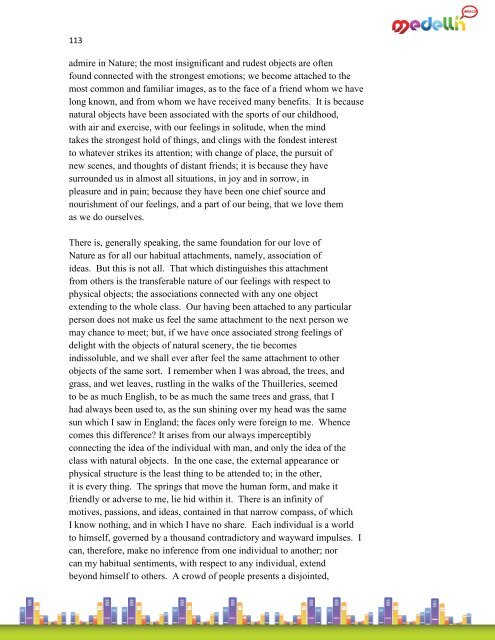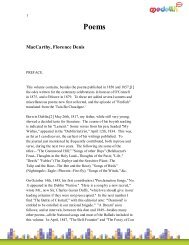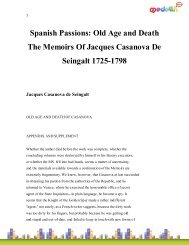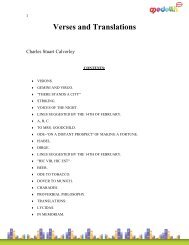Lectures On The English Poets William Hazlitt
Lectures On The English Poets William Hazlitt
Lectures On The English Poets William Hazlitt
Create successful ePaper yourself
Turn your PDF publications into a flip-book with our unique Google optimized e-Paper software.
113<br />
admire in Nature; the most insignificant and rudest objects are often<br />
found connected with the strongest emotions; we become attached to the<br />
most common and familiar images, as to the face of a friend whom we have<br />
long known, and from whom we have received many benefits. It is because<br />
natural objects have been associated with the sports of our childhood,<br />
with air and exercise, with our feelings in solitude, when the mind<br />
takes the strongest hold of things, and clings with the fondest interest<br />
to whatever strikes its attention; with change of place, the pursuit of<br />
new scenes, and thoughts of distant friends; it is because they have<br />
surrounded us in almost all situations, in joy and in sorrow, in<br />
pleasure and in pain; because they have been one chief source and<br />
nourishment of our feelings, and a part of our being, that we love them<br />
as we do ourselves.<br />
<strong>The</strong>re is, generally speaking, the same foundation for our love of<br />
Nature as for all our habitual attachments, namely, association of<br />
ideas. But this is not all. That which distinguishes this attachment<br />
from others is the transferable nature of our feelings with respect to<br />
physical objects; the associations connected with any one object<br />
extending to the whole class. Our having been attached to any particular<br />
person does not make us feel the same attachment to the next person we<br />
may chance to meet; but, if we have once associated strong feelings of<br />
delight with the objects of natural scenery, the tie becomes<br />
indissoluble, and we shall ever after feel the same attachment to other<br />
objects of the same sort. I remember when I was abroad, the trees, and<br />
grass, and wet leaves, rustling in the walks of the Thuilleries, seemed<br />
to be as much <strong>English</strong>, to be as much the same trees and grass, that I<br />
had always been used to, as the sun shining over my head was the same<br />
sun which I saw in England; the faces only were foreign to me. Whence<br />
comes this difference? It arises from our always imperceptibly<br />
connecting the idea of the individual with man, and only the idea of the<br />
class with natural objects. In the one case, the external appearance or<br />
physical structure is the least thing to be attended to; in the other,<br />
it is every thing. <strong>The</strong> springs that move the human form, and make it<br />
friendly or adverse to me, lie hid within it. <strong>The</strong>re is an infinity of<br />
motives, passions, and ideas, contained in that narrow compass, of which<br />
I know nothing, and in which I have no share. Each individual is a world<br />
to himself, governed by a thousand contradictory and wayward impulses. I<br />
can, therefore, make no inference from one individual to another; nor<br />
can my habitual sentiments, with respect to any individual, extend<br />
beyond himself to others. A crowd of people presents a disjointed,

















